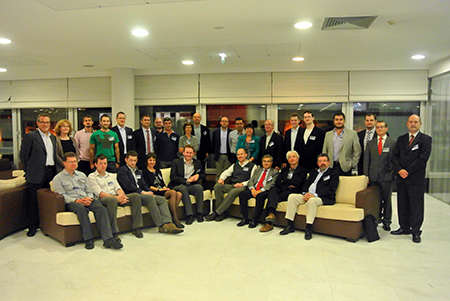 Dr Laurence Hardwick: “The current shelf life for lithium batteries used in stationary energy storage needs to be 5-10 times longer”
Dr Laurence Hardwick: “The current shelf life for lithium batteries used in stationary energy storage needs to be 5-10 times longer”
The Stephenson Institute for Renewable Energy has been awarded £4million to address the insufficient lifespan of batteries that are used to store energy made by renewable industries.
Stable Interfaces for Rechargeable Batteries (SIRBATT), funded by the European Commission’s Framework 7 programme, aims to enhance the lifetime of batteries used to store the energy generated from renewable industries, such as solar or wind power, by improving the structure and reactions at lithium battery electrode and electrolyte interfaces.
SIRBATT consists of 12 academic and industrial partners from across the EU and its International Advisory Board includes leading battery research groups from the US and Japan.
 SIRBATT’s inaugural meeting was held at the University of Aveiro, Portugal
SIRBATT’s inaugural meeting was held at the University of Aveiro, Portugal
Dr Laurence Hardwick and Dr Gilberto Teobaldi, from the Department of Chemistry and members of the Stephenson Institute, will co-ordinate the project.
Dr Hardwick said: “This innovative project will explore the issues that currently limit the lifespan of batteries used in stationary battery storage. It brings together a wide range of complementary research expertise in the study of battery electrode interfaces, covering both the experimental and theoretical aspects of this emerging area.
“The current shelf life for lithium batteries used in stationary energy storage needs to be 5-10 times longer if companies are to invest in stationary battery storage to counter Li-ion batteries existing price premium. ”
SIRBATT recently held its inaugural meeting of partners at the University of Aveiro, Portugal which was attended by representatives from all partners, members of the International Advisory Board and the EC.
Further information about the project can be found at http://www.liv.ac.uk/sirbatt
